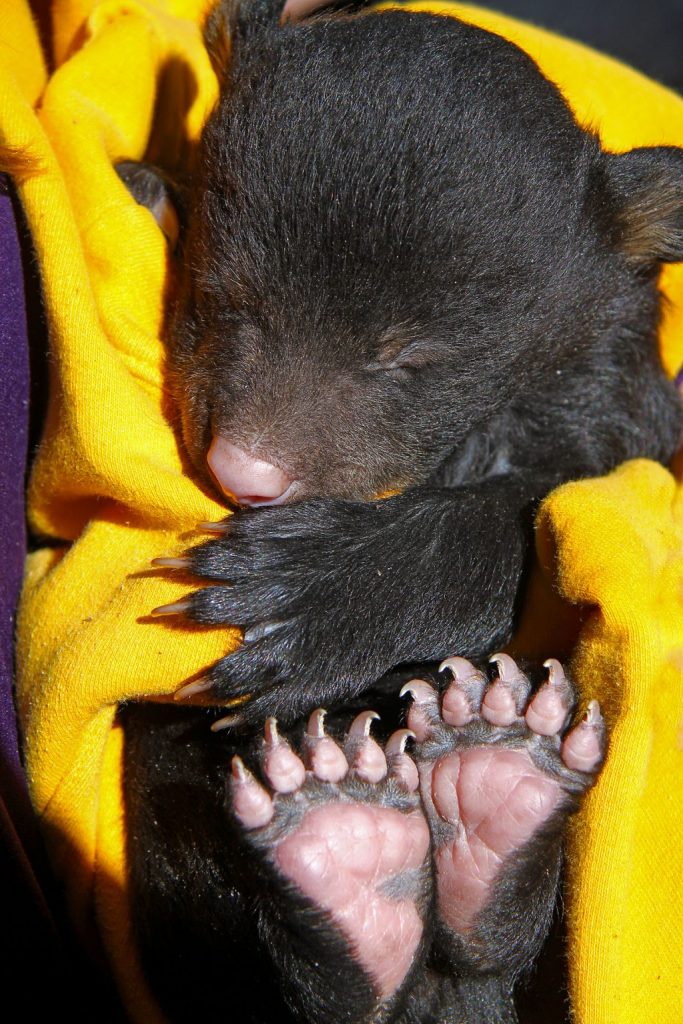Wildlife science program goes “denning”

This archived article was written by: Mike King
Tracking down a mother bear in her den and holding her bear cubs has become an annual event for students in Dr. Mike King’s wildlife science program.
On March 8, USU Eastern wildlife science students joined Brad Crompton, Utah Division of Wildlife Resources (UDWR) biologist, on a “Bear Denning” expedition near the Dugout Mine, about 20 minutes east of Price. Wildlife Science students and faculty from the USU Uintah Basin campus joined the excursion.
Each year, UDWR biologists keep track of several female black bears in Eastern Utah via radio-telemetry equipment. Bears are captured and fitted with radio-transmitting collars and then monitored during the year. This monitoring effort helps biologists more fully understand bears movements, habitat preferences, how close they are coming to urbanized areas and humans, etc.
Besides the movement and habitat-use data, biologists are able get information about bear health and reproduction. This is where the “denning” activities come in. Bears go into a period of inactivity during the winter months and rest in a den for several months.
Biologists locate the radio-collared bears during the winter months and identify approximate den locations with the telemetry equipment while flying in a fixed-wing aircraft. Once the approximate location of the den is located, the biologists must then hike to the den to determine the condition and reproductive status of the bear.
The hike is really where the fun begins. Though on a map, the distance may look relatively short – maybe only a half a mile as the crow flies – the hike is rarely that easy. The most recent hike was only a half a mile from the road, but it was a steep uphill climb that took participants about an hour and a half to get to the den location. Fortunately, the weather was great and it was a perfect day for hiking. Last year the hike took over three hours and it snowed all day.
Once at the den, Crompton tranquilizes the mother bear with a dart fired from an air pistol. This keeps her asleep while he checks her health and determines if she has cubs. This year, there were two cubs, a female and a male, and mother and cubs seemed to be in excellent health.
The highlight of the day is the opportunity students to actually hold the bear cubs while the mother bear is immobilized. One might think that the mother would reject the cubs if they smell like humans, but years of experience has shown that the mothers keep taking care of the cubs just as if they hadn’t been handled. The cubs don’t seem to be fazed by the handling though they do squeal, yawn, stretch, snuggle, and sometimes even scratch – they have unusually long claws for such a tiny body. The drug keeping the mother bear asleep usually lasts about and hour, so the cubs are returned to her before she wakes up.
Once the cubs are back in the den with the mother, the hikers leave the den site and make the descent down the hill to the vehicles.
Though participants are greatly touched and exhilarated by the experience, the major point of the trip for wildlife students is to help them understand more fully what a wildlife biologist does in the real world and the challenges they face on a daily basis.
USU Eastern students participating in this year’s trip included TJ Cook, Shawn Devereaux, Shalayne Luke, Brayden Huntsman, Mike Sacco, Matt Thayne, Andrew Todachinnie, Xaela Walden, Heather Ferrell and Jesse Winn. Wade Arave, USU Eastern enrollment services admissions adviser, traveled with the group.
The bachelor’s degree in wildlife science is one of the new degree programs available at USU Eastern. The first students to complete the degree are expected to graduate in the spring 2015. In addition to the degree program, there is an active student wildlife club on campus.
A meeting for all wildlife science majors and anyone interested in finding out more about the degree or the wildlife club will be on Thursday, March 27 at 8 p.m. in WIB room 206.
If you want to learn about the wildlife science degree, attend the meeting or contact King at [email protected] or his office WIB room 133, or call 613-5400.




